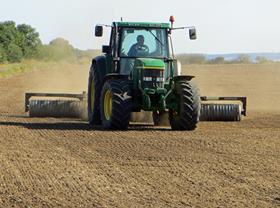
A new Environment Protection Act is vital if British farmers and growers are to continue to compete in international markets after the UK leaves the European Union, according to a new report.
The Environmental Audit Committee (EAC) has said farmers face a “triple jeopardy” after Brexit, due to the loss of CAP funding, tariff costs and new trading relationships with regions outside of the EU. These new relationships could see increased competition from countries with lower food standards, animal welfare and environmental protection.
The international, legislative and financial impacts of leaving the EU are 'united by a need to establish clear objectives to replace the framework of environmental protections previously provided by the EU', the report said.
Copying EU legislation into UK law will not be enough to ensure total environmental protection, and there is a risk that EU legislation is transposed into UK law but is no longer updated, and with no body enforcing it and can be eroded with minimal parliamentary scrutiny, the report said. A new Environmental Protection Act should be passed before Brexit, it concluded.
EAC chair Mary Creagh MP said: 'Changes from Brexit could put our countryside, farming and wildlife at risk. Protections for Britain's wildlife and special places currently guaranteed under European law could end up as 'zombie legislation' even with the Great Repeal Bill.
“UK farming faces significant risks – from a loss of subsidies and tariffs on farm exports to increased competition from countries with weaker food, animal welfare and environmental standards. The Government must not trade away these key protections as we leave the EU. It should also give clarity over any future farm subsidies.'
The Soil Association said it welcomes the EAC conclusion that farming and environment policies are interdependent. “The UK’s future agricultural policy and subsidy regime must include clear objectives to support existing organic producers and help more farmers adopt sustainable methods so that they become the norm,” the body said.
“The Soil Association also supports the call from the EAC for all future subsidy payments to be linked to the delivery of public goods, supported by strong evidence and that criteria for farm subsidies need to be simple and targeted with measurable outcomes.”



